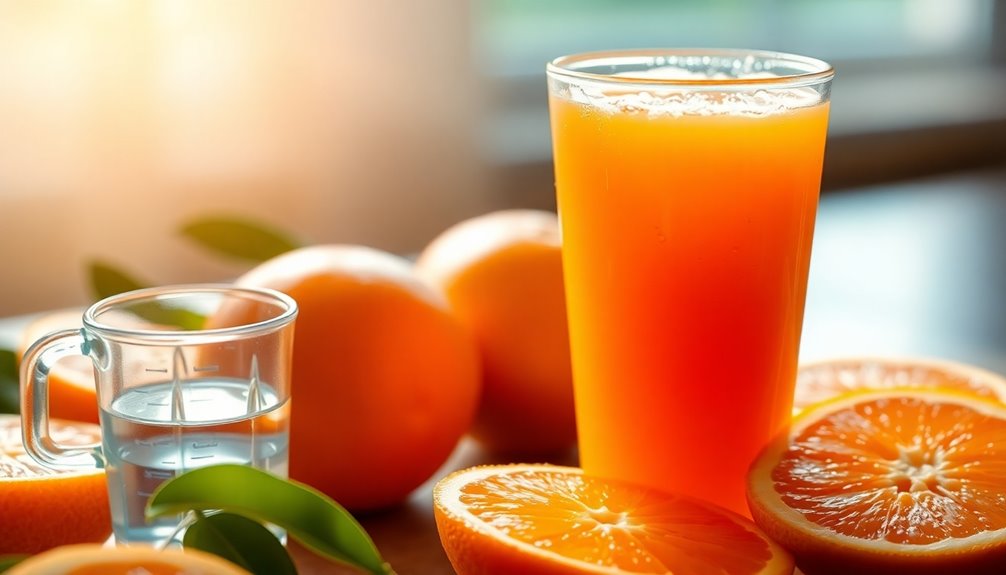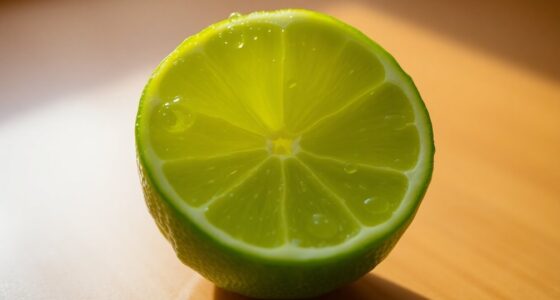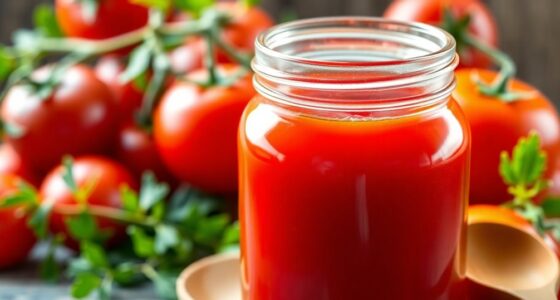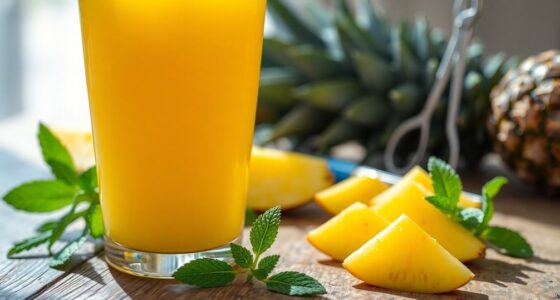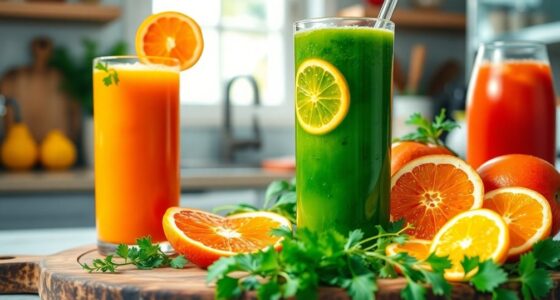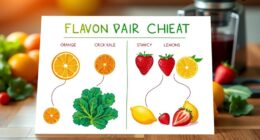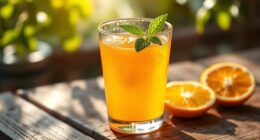Surprisingly, your orange juice might contain trace amounts of alcohol—often below 0.5% ABV—due to natural fermentation. This process can occur if the juice isn't pasteurized or is stored improperly, and it's especially common in organic or non-commercial brands. Misleading labeling practices can also hide the actual alcohol content, leaving you unaware. If you want to learn more about how to choose the best juice for your health, you should explore your options carefully.
Key Takeaways
- Natural fermentation of orange juice can produce trace amounts of alcohol, often below 0.5% ABV if not pasteurized or stored correctly.
- Some organic or "natural" orange juice products may contain higher alcohol levels due to less processing and preservation methods.
- Misleading labeling practices can obscure the actual alcohol content in orange juice, leaving consumers unaware of its presence.
- Freshly squeezed orange juice left unrefrigerated can develop alcohol, highlighting the importance of proper storage.
- Always check ingredient labels for transparency, as flavor packs and other additives may also influence the juice's overall quality and safety.
Understanding Natural Fermentation in Juice Production
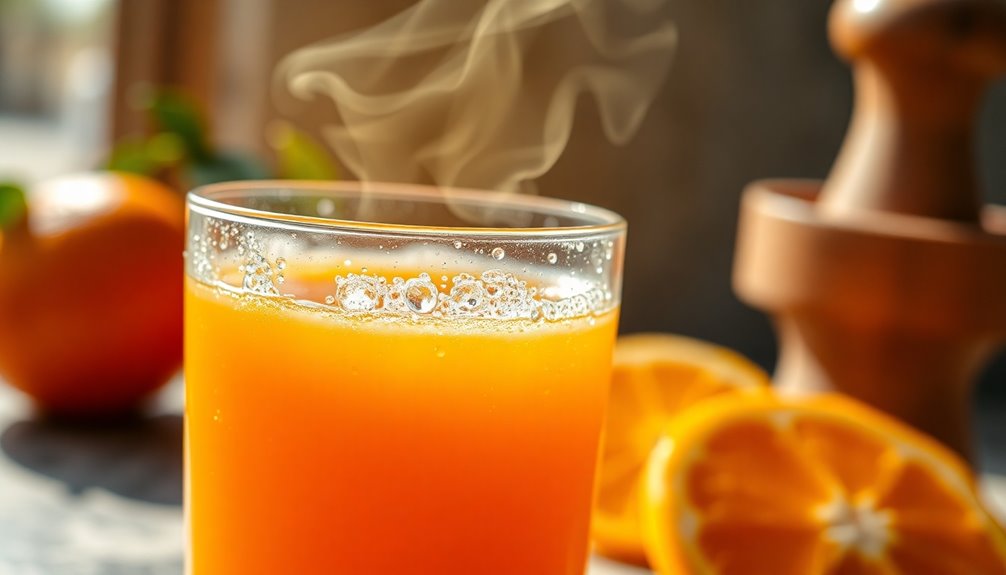
When you enjoy a glass of orange juice, you mightn't realize that natural fermentation can occur during its production.
This process happens when yeast converts the sugars in the juice into alcohol, leading to the presence of trace amounts of alcohol, often below 0.5%. If juice isn't pasteurized or is stored in anaerobic conditions, fermentation can happen unintentionally.
Even freshly squeezed juice can develop these small alcohol levels if left unrefrigerated for too long.
While regulations don't require labeling for alcohol content under 0.5%, this can leave you unaware of the potential fermentation.
Understanding natural fermentation helps you appreciate the complexities of your favorite beverage and the science behind its production.
The Role of Flavor Packs in Commercial Juices
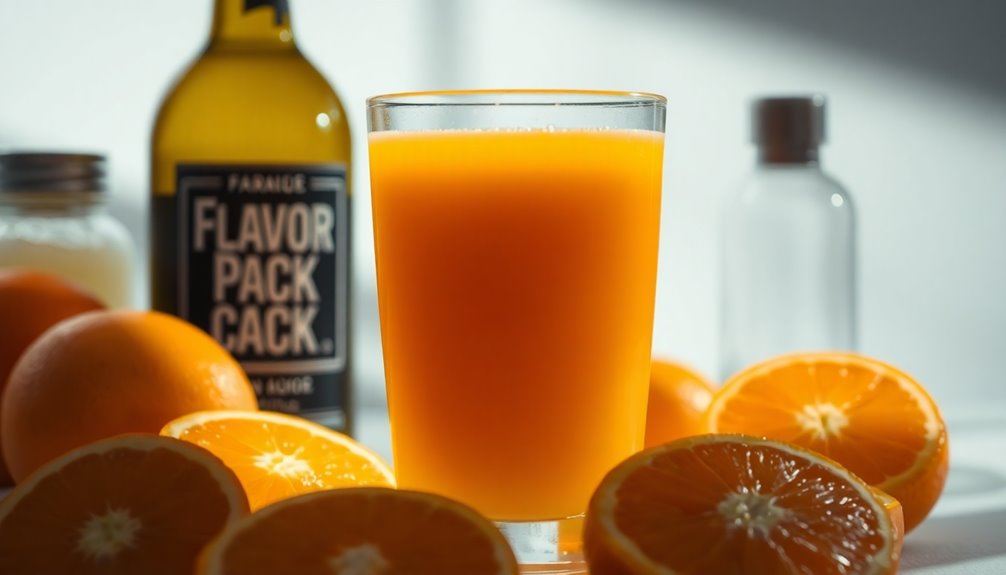
While you might think you're sipping pure orange juice, many commercial varieties rely on flavor packs to mimic the taste of fresh fruit.
These packs are designed to restore lost flavors after the juicing and storage process, but they often don't resemble natural flavors.
Here's what you should know:
- Flavor packs use chemicals like ethyl butyrate.
- They can extend juice shelf life up to a year.
- Different regions receive customized flavor packs.
- Flavoring companies also create fragrances for perfumes.
- Many consumers remain unaware of these chemical alterations.
Why Aren't Flavor Packs Listed as Ingredients?
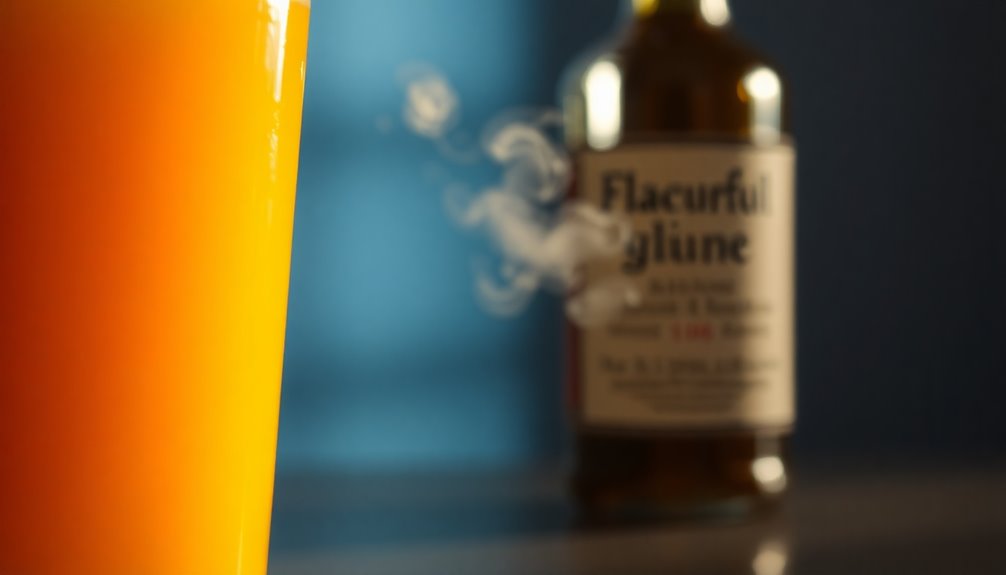
Why don't you see flavor packs listed as ingredients on your orange juice label? The reason lies in ingredient labeling laws that categorize flavor packs as by-products of oranges.
This means companies can use these flavor packs—often made from orange essence and oil—without disclosing them, leaving you unaware of what's in your juice. Many of these flavor packs, like ethyl butyrate, are engineered to mimic the taste of fresh oranges.
Consequently, the consistent flavor across brands isn't always from fresh fruit. With the FDA lacking a clear definition for "natural," companies can market their juices in this manner, even when flavor packs are used, obscuring the truth about what you're actually drinking.
The Impact of Processing on Juice Quality
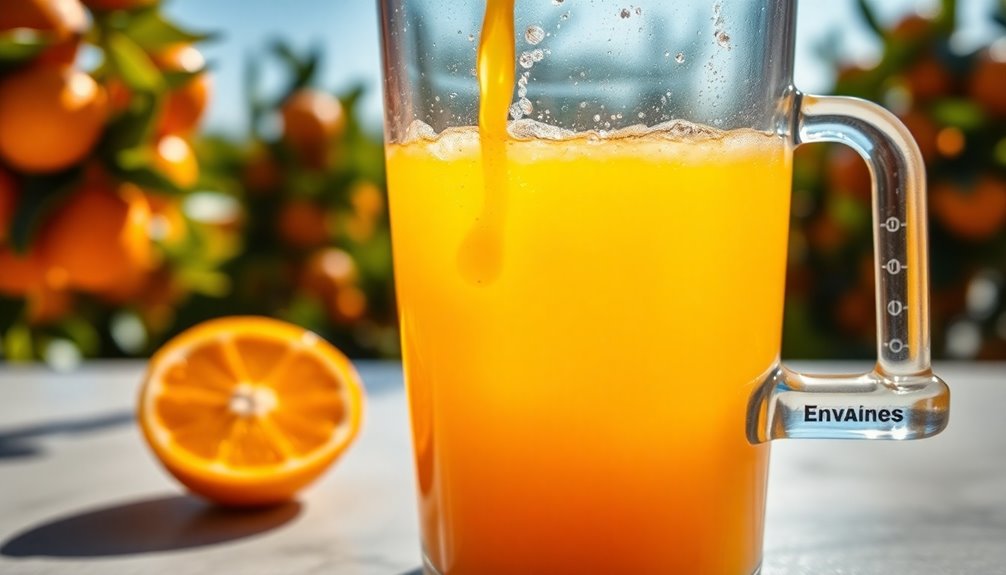
When you grab a carton of store-bought orange juice, you mightn’t realize how much processing it’s gone through. Many brands use a process called pasteurization to extend shelf life, which can alter the juice’s natural flavor and nutrients. Additionally, the juice may undergo methods like filtration and flavor enhancement, making it far from the fresh-squeezed experience. You might be surprised to learn that if you’re curious about how long orange juice takes to freeze, it typically takes about 4 to 6 hours in a standard freezer, depending on the quantity.
Techniques like oxygen removal and the addition of flavor packs can alter the taste and diminish the nutritional value you expect from fresh juice.
This processing not only changes the flavor but also strips away essential nutrients, leaving you with a product that's far from the whole fruit experience.
Flavor Alteration Techniques
Many consumers may not realize that the flavor of processed orange juice can be considerably altered through various techniques. Here's how it happens:
- Flavor packs: Often contain chemicals like ethyl butyrate to mimic fresh orange taste.
- Oxygen removal: Juice is stored in tanks, extending shelf life but sacrificing flavor.
- Pasteurization: Kills antioxidants and enzymes, reducing Vitamin C and nutritional value.
- Perfume-like creation: Flavor packs are crafted similarly to perfumes, emphasizing their artificiality.
- Market tailoring: Companies adjust flavors based on consumer preferences, raising authenticity concerns.
These alterations can lead to a juice experience that's far from the fresh-squeezed delight you might expect. Understanding the impact of nutritional considerations for cats can also shed light on the importance of knowing what goes into your food and drinks.
This makes it essential to read labels and understand what's in your processed orange juice.
Nutritional Degradation Process
Although you might enjoy the convenience of processed orange juice, the nutritional degradation that occurs during its production greatly impacts its quality.
The juicing process removes oxygen to extend shelf life, but this storage leads to significant loss of flavor and essential nutrients. Pasteurization kills beneficial antioxidants and enzymes, which further depletes the juice's nutritional value.
Even when flavor packs attempt to mimic the taste of freshly squeezed Valencia orange juice, they often use artificial compounds that fall short of delivering something good.
As a result, processed juices can be high in sugar but low in nutrients and fiber, ultimately contributing to health issues. Additionally, whole fruits provide more vitamins and minerals, promoting better overall health outcomes compared to juices alone.
Freshly squeezed juice is always a better choice for retaining those crucial nutrients your body craves.
Alcohol Content: What You Need to Know
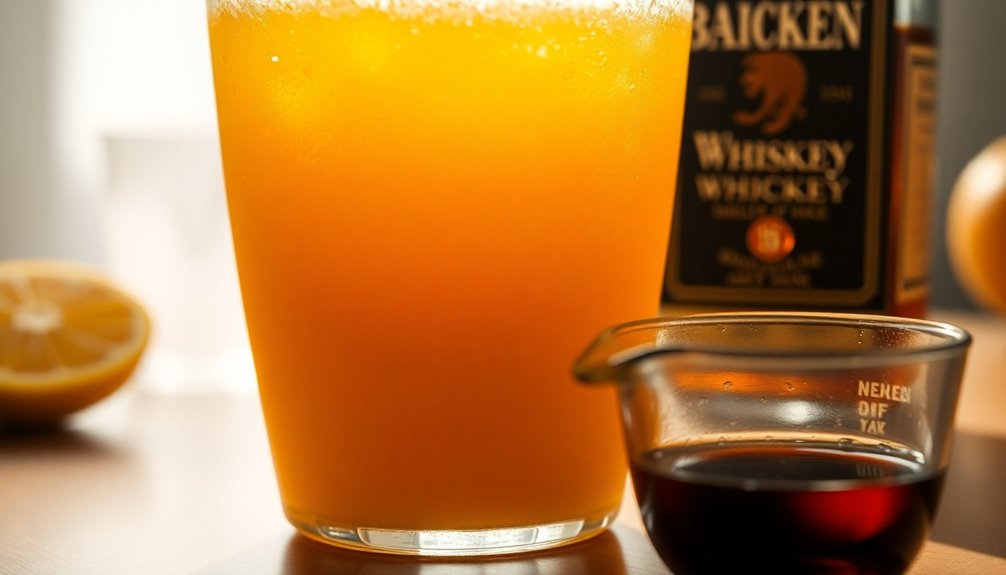
You might be surprised to learn that some orange juice products can contain trace amounts of alcohol due to natural fermentation during processing.
Many labels don't disclose this information, which can lead to confusion for consumers.
If you're avoiding alcohol for any reason, it's important to be aware of these potential alcohol levels in your juice.
Alcohol in Juice Products
When considering the alcohol content in juice products, it's important to recognize that some juices can contain trace amounts of alcohol, often due to natural fermentation.
You might enjoy a glass of orange juice every day, but you may never know what's lurking in your favorite drink. Here are a few key points to keep in mind:
- Trace alcohol levels usually stay below 0.5% ABV.
- Natural fermentation can happen if juice is stored too long.
- Organic or "natural" juices may have higher alcohol content.
- Mainstream orange juices are typically non-alcoholic.
- Always check labels for specific alcohol content.
Staying informed helps you make better choices, especially if you're avoiding alcohol for health reasons!
Misleading Labeling Practices
Misleading labeling practices can complicate your understanding of what's really in your juice, especially regarding alcohol content. Many juice products contain flavor packs that mightn't be fully disclosed.
These flavor packs can have trace amounts of alcohol, a byproduct of fermentation, yet the FDA doesn't require manufacturers to list this on labels. This lack of transparency can leave you unaware of what you're actually drinking.
You might assume that 100% fruit juice is completely alcohol-free, but without standard definitions and regulations, this assumption is risky.
With only 5% of Americans consuming fresh oranges daily, you're likely to encounter flavored juices that could contain hidden alcohol, highlighting the urgent need for clearer labeling practices. Additionally, it's crucial to recognize that cybersecurity vulnerabilities can also arise from misleading product information that exposes consumers to risks.
Stay informed!
Health Implications of Consuming Packaged Juice
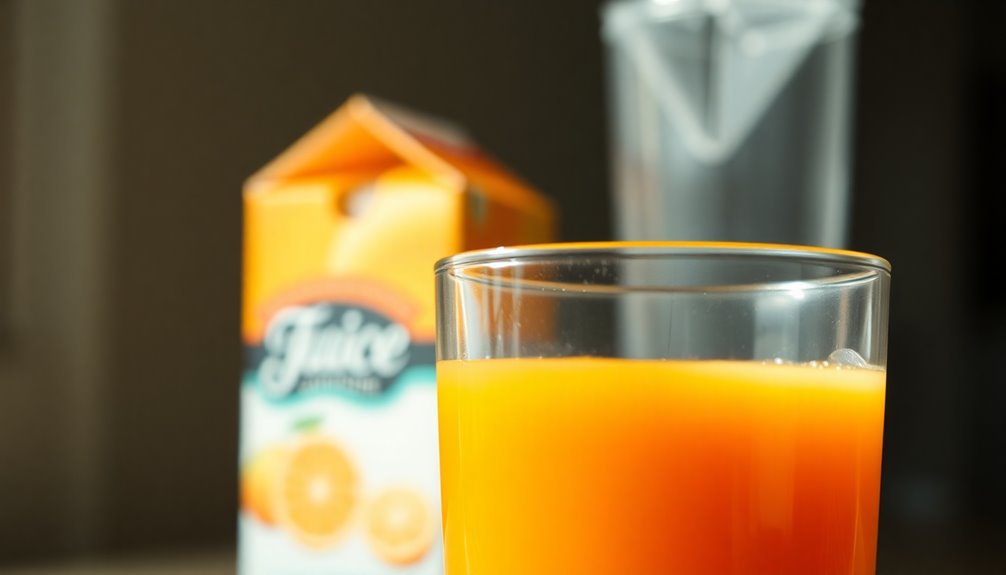
Although packaged orange juice is often marketed as a healthy choice, its health implications can be more complex than they seem. Here are some concerns you should consider:
- High sugar levels may lead to obesity and metabolic syndrome.
- Lack of fiber compared to whole fruits can affect satiety and digestion.
- The pasteurization process might kill essential antioxidants and enzymes.
- Flavor packs can contain unstudied additives like ethyl butyrate.
- Excessive juice consumption can increase calorie intake without the benefits of whole fruits.
Health experts suggest diluting juice with water to lower sugar consumption and encourage eating whole fruits instead.
Navigating Juice Labels: What to Look For
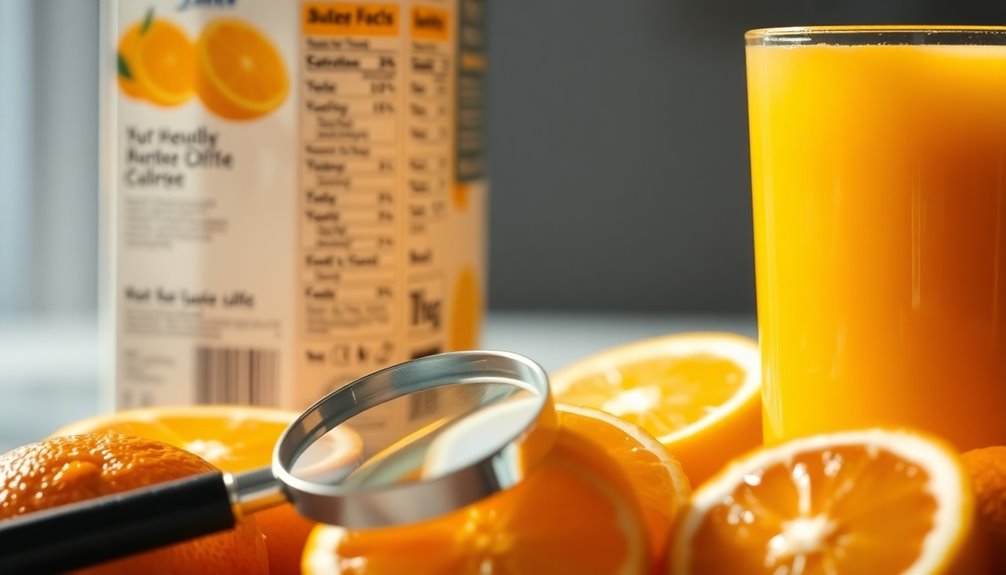
When you pick up a juice bottle, ingredient transparency is key, so always check for "100% juice" on the label.
Be cautious of flavor packs; they mightn't give you the fresh taste you expect.
Finally, keep an eye out for added sugars, as many juices can pack a surprising amount of sweetness. Additionally, be aware that some juices may also contain essential oils which can enhance flavor but may not always be disclosed on the label.
Ingredient Transparency Matters
Understanding what's really in your juice can be challenging, especially with the lack of clear definitions and transparency on labels.
Many consumers assume "natural" means healthier, but the FDA doesn't clearly define this term. It's vital to scrutinize juice labels for a better understanding of what you're drinking.
Here are some things to look for:
- Ingredient List: Check for unfamiliar chemicals, like ethyl butyrate.
- Natural vs. Artificial Flavors: Distinguish between truly natural and processed flavors.
- Percentage of Juice: Confirm it states 100% juice, but verify the contents.
- Production Methods: Research how the juice is processed.
- Freshness Indicators: Look for "fresh-squeezed" or "not from concentrate."
Additionally, being aware of the brewing methods used in coffee can enhance your understanding of how different ingredients interact in beverages, aiding you in making informed choices.
Being informed helps you make healthier choices!
Understanding Flavor Pack Labels
As you navigate juice labels, it is crucial to recognize the role of flavor packs, which are often used to mimic the taste of fresh orange juice. These packs can contain chemical additives like ethyl butyrate, misleadingly labeled as orange by-products. The lack of a clear FDA definition for "natural" can lead to confusion about what's in your juice.
Here's a quick comparison of common juice terms:
| Label | Meaning |
|---|---|
| 100% Orange Juice | No added sugars or flavors; pure juice. |
| From Concentrate | Juice extracted, concentrated, then rehydrated. |
| With Added Flavor | May contain artificial additives; not pure juice. |
| Natural Flavor | Lacks a standardized definition; could be misleading. |
Stay informed and choose wisely! Understanding the impact of chemical additives can help you make healthier choices when selecting juices.
Fresh Juice vs. Packaged Juice: A Nutritional Comparison
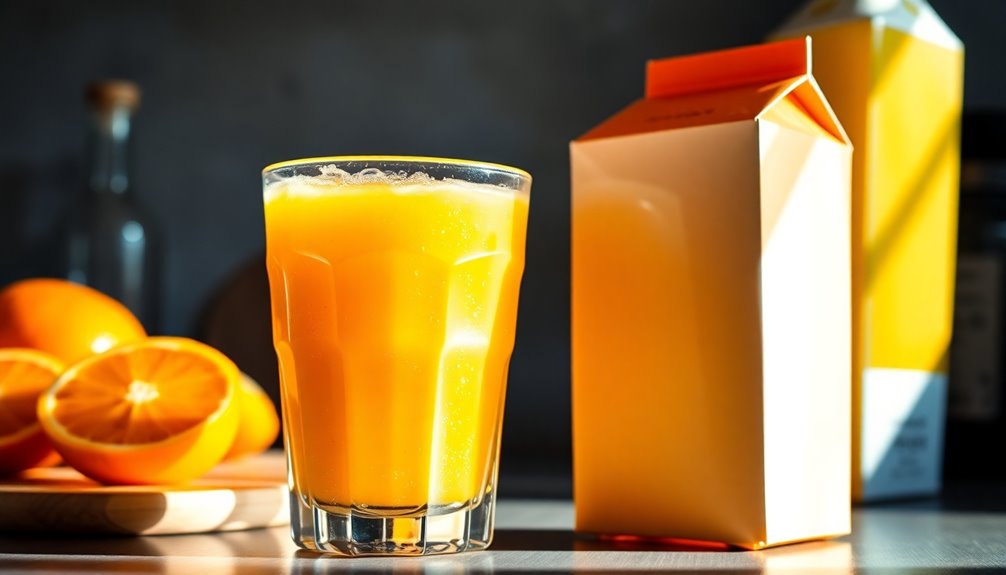
While many people enjoy the taste of orange juice, the nutritional differences between fresh and packaged varieties can be striking. Freshly squeezed juice retains more nutrients and antioxidants, while packaged juice often loses value due to processing.
Here are some key points to bear in mind:
- Packaged juice may contain added flavor packs like ethyl butyrate.
- Both types can have high sugar content, contributing to health issues.
- Only 5% of Americans consume fresh oranges daily.
- Fresh juice is a better source of fiber compared to processed options.
- Lacto-fermented juices are emerging as healthier alternatives.
- Choosing fresh juice can also provide aromatherapy benefits, enhancing overall well-being through the uplifting scents of citrus.
Choosing fresh juice can enhance your nutrient intake, but be mindful of sugar levels in both types.
The History of Orange Juice Marketing
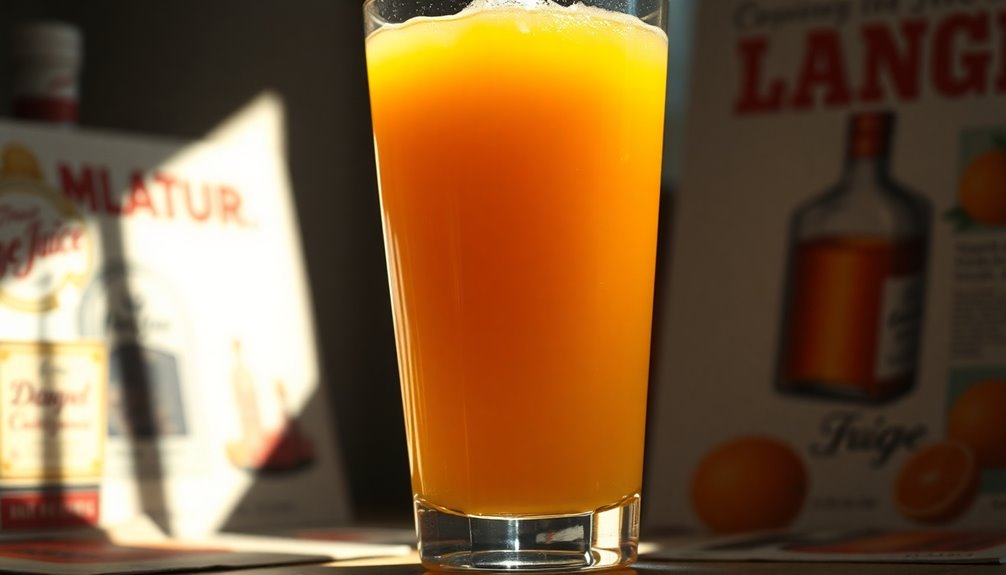
Since the early 20th century, the marketing of orange juice has evolved dramatically, transforming it into a staple in American households.
In the 1920s, advertisers highlighted the vitamin C content of oranges, tapping into the public's growing interest in nutrition. Sunkist cleverly promoted orange juice as a remedy for acidosis, showcasing how health trends influenced consumer behavior.
The citrus industry capitalized on the vitamin craze, turning orange juice from a homemade treat into a commercial staple.
After World War II, innovations like frozen concentrate made orange juice more accessible, catering to busy lifestyles. As convenience became key, packaged orange juice soared in popularity, leading to sales that far surpassed fresh orange consumption.
Making Informed Choices: Tips for Selecting Juice
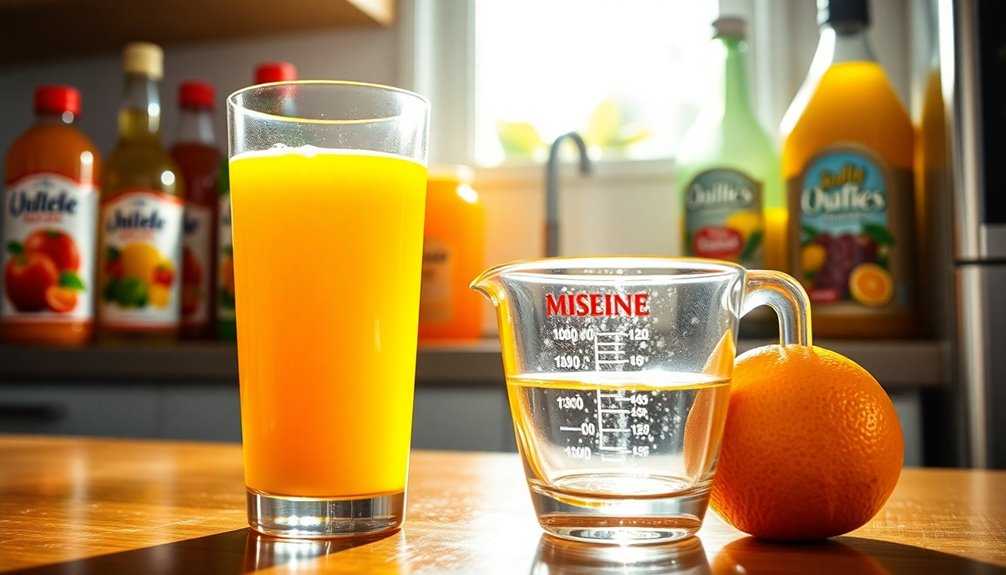
Choosing the right juice can be a challenge, especially with so many options on the market.
To make informed choices, keep these tips in mind:
- Look for "100% juice" labels to avoid added sugars and artificial ingredients.
- Research the juice production process; many brands use flavor packs to imitate fresh juice.
- Opt for freshly squeezed juice for better nutrients and flavor.
- Consider diluting juice with water to lower sugar intake while maintaining taste.
- Support brands that prioritize transparency in sourcing and processing.
- Be mindful of the shelf life of freshly squeezed juices, as freshness impacts both taste and nutrient retention.
Frequently Asked Questions
Is It True That Orange Juice Has Alcohol?
Yes, it's true that orange juice can contain trace amounts of alcohol.
When stored, the natural sugars can ferment, leading to the production of ethanol.
Studies have found that commercially produced orange juice might've alcohol levels ranging from 0.1% to 0.3% by volume.
While this is minimal and unlikely to cause intoxication, it's important to be aware of this, especially if you're avoiding alcohol for personal or health reasons.
Is Minute Maid Real Orange Juice or Fake?
When you ask if Minute Maid is real orange juice or fake, it's important to know that while it's marketed as 100% juice, it often includes flavor packs and undergoes processing that alters its taste and nutritional value.
The juice's flavor can diminish during storage, requiring these additives to enhance it.
Is 100% Orange Juice Really 100%?
When you ask if "100% orange juice" is really 100%, you might be surprised.
Many of these juices contain flavor packs designed to mimic the taste of fresh oranges. While they're labeled as 100% juice, these packs can include chemically altered substances, raising questions about authenticity.
What Foods Have 0.5 Alcohol?
Imagine biting into a juicy piece of fruit and discovering it's hiding a tiny secret.
Some foods can contain about 0.5% alcohol. Fermented items like kombucha and sourdough bread often carry this trace amount.
Even certain vinegars and overripe fruits can surprise you. While it's typically negligible and won't get you tipsy, it's something to keep in mind if you're avoiding alcohol for health or personal reasons.
Conclusion
In your quest for quality juice, remember to scrutinize the labels and stay savvy. Savoring the sweetness of fresh, flavorful options keeps you informed and invigorated. Don't let deceptive designs derail your dietary decisions. By choosing consciously, you can relish the real benefits of wholesome juice without unexpected surprises. So, stay sharp, sift through the selections, and sip safely—your health deserves nothing less than the truth behind your treasured orange juice!
Susannah expertise lies in researching and compiling evidence-based content on juicing, nutrition, and overall health. She is committed to ensuring that The Juicery World offers accurate, up-to-date, and trustworthy information to empower readers to take control of their health. Susannah’s goal is to inspire individuals to embrace juicing as a way to nourish their bodies and live their best lives.

